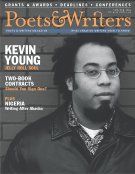Of the Abacha government?
Yeah, this was in 1997, and Abacha died in 1998. So when they saw that
picture they arrested him…just because he had a picture of Wole
Soyinka. That shows you how paranoid they were. There was a poet that
was killed in Lagos. The story at that time was that he had started
turning against other poets, informing against other intellectuals,
people in the prodemocracy struggles. And I think when the military got
tired of using him, they just killed him. But there were a lot of
people like that, who became turncoats just to survive, or for material
benefits.
How long was your friend in jail?
Two years, or just under two years.
For having a picture of Wole Soyinka?
Yeah, they just kept you in jail without trial.
Was he released then, when Abacha died?
Yeah.
How is it now? Is there freedom of press, or freedom of speech?
Yeah, that is the good thing that has happened with the coming of
democracy. People can actually write now what they want to write. They
can actually criticize the government, they can say what is wrong with
the government. They can express themselves. This was something that we
didn't have during the military years. If you did that at that time,
you would get arrested. But now, whether it's effective or not, you can
say what you think.
In America, to be a writer, all you effectively have to do is have a computer and write a lot. How is Nigeria different?
Nigeria
is very, very different. You don't have a computer in the first place.
I mean, I'm talking about an average young writer in Nigeria. You have
no computer—longhand. And you do it at your leisure time, because you
have to work to make ends meet. So you write when you have time. You
just create time. Then after that you find money to type it. Then you
try to find a publisher. It's not easy. The publishers are just not
there.
They're going out of business?
Yeah, because there is no market for books. Times are so hard. Things
are so hard that people just can't afford to buy books for pleasure.
You have the publishers who would consider publishing textbooks for
universities, for schools, for exams. These are the kinds of books that
people mostly buy. But it's very hard to find people buying novels just
to read for pleasure, or poetry books for that matter.









